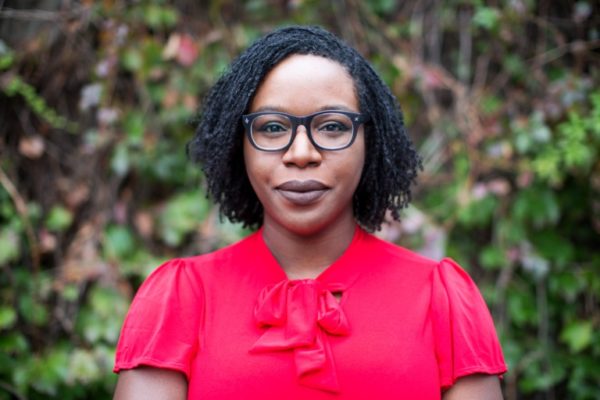
Lesley Nneka Arimah has won the 2019 Caine Prize, the prize’s twentieth edition, for her short story “Skinned,” published in McSweeney’s Quarterly Concern‘s Issue 53. The announcement was made an hour ago at the award dinner at Senate House, University of London, organised in partnership with SOAS and the Centre for African Studies. The Nigerian writer, whose debut book, the story collection What It Means When a Man Falls from the Sky (2017), won the Kirkus Prize and got her picked as one of the US National Book Foundation’s 5 under 35, had previously been shortlisted for the £10,000 prize in 2016, for the title story of her collection, and in 2017, for “Who Will Greet You at Home?” She is the sixth Nigerian to win the prize.
Founded in 2000, the Caine Prize—named after the late Sir Michael Caine, former Chairman of Booker plc and Chairman of the Booker Prize management committee—honours a short story of 3,000-10,000 words published in English by an African writer.
Here is the press release description of Arimah’s “Skinned”:
“Skinned” envisions a society in which young girls are ceremonially ‘uncovered’ and must marry in order to regain the right to be clothed. It tells the story of Ejem, a young woman uncovered at the age of fifteen yet ‘unclaimed’ in adulthood, and her attempts to negotiate a rigidly stratified society following the breakdown of a protective friendship with the married Chidinma. With a wit, prescience, and a wicked imagination, “Skinned” is a bold and unsettling tale of bodily autonomy and womanhood, and the fault lines along which solidarities are formed and broken.
In announcing the prize, the chair of the judges, Peter Kimani, said: “The winner of this year’s Caine Prize for African Writing is a unique retake of women’s struggle for inclusion in a society regulated by rituals. Lesley Nneka Arimah’s ‘Skinned’ defamiliarizes the familiar to topple social hierarchies, challenge traditions and envision new possibilities for women of the world. Using a sprightly diction, she invents a dystopian universe inhabited by unforgettable characters where friendship is tested, innocence is lost, and readers gain a new understanding of life.”
Alongside Kimani on the 2019 judging panel were: Sefi Atta, the Nigerian author of Everything Good Will Come, who was shortlisted for the 2006 prize; Margie Orford, the South African writer of crime thrillers; Scott Taylor, professor and director of the African Studies Program at Georgetown University; and Olufemi Terry, Sierra Leonean writer and winner of the 2010 Caine Prize.
“We African writers must centre the African gaze, we must centre the Nigerian gaze, the Cameroonian gaze, the Ethiopian gaze, the Kenyan gaze. We need to be writing to and for each other and we also need to play,” Arimah said. She added: “I think of experimentation as the sign of expertise and I think that we must continue, as we have been doing, to play within the bounds of our literatures, within the bounds of our cultures, within the bounds of our worlds.”
Lesley Nneka Arimah was born in the UK and grew up in Nigeria. Her short stories have received the Commonwealth Short Story Prize and an O. Henry Prize. She was selected for the National Book Foundation’s 5 Under 35 and her debut collection What It Means When a Man Falls from the Sky won the 2017 Kirkus Prize, the 2017 New York Public Library Young Lions Fiction Award, and was selected for the New York Times/PBS book club among other honours. A 2019 United States Artists Fellow in Writing, she lives in Las Vegas.
The four other shortlisted writers, who will receive £500 and whose short stories can be read on the Caine Prize website, are:
- Meron Hadero (Ethiopia) for “The Wall,” published in McSweeney’s Quarterly Concern, Issue 52 (2018).
- Cherrie Kandie (Kenya) for “Sew My Mouth,” published in ID Identity: New Short Fiction From Africa (2018).
- Ngwah-Mbo Nana Nkweti (Cameroon) for “It Takes A Village Some Say,” published in The Baffler (2017).
- Tochukwu Emmanuel Okafor (Nigeria) for “All Our Lives,” published in ID Identity: New Short Fiction From Africa (2018).
Previous winners of the Caine Prize are: Sudan’s Leila Aboulela (2000); Nigeria’s Helon Habila (2001); Kenya’s Binyavanga Wainaina (2002); Kenya’s Yvonne Owuor (2003); Zimbabwe’s Brian Chikwava (2004); Nigeria’s Segun Afolabi (2005); South Africa’s Mary Watson (2006); Uganda’s Monica Arac de Nyeko (2007); South Africa’s Henrietta Rose-Innes (2008); Nigeria’s EC Osondu (2009); Sierra Leone’s Olufemi Terry (2010), Zimbabwe’s NoViolet Bulawayo (2011); Nigeria’s Rotimi Babatunde (2012); Nigeria’s Tope Folarin (2013); Kenya’s Okwiri Oduor (2014); Zambia’s Namwali Serpell (2015); South Africa’s Lidudumalingani (2016); Sudan’s Bushra al-Fadil (2017); and Kenya’s Makena Onjerika (2018).
The five shortlisted stories are published annually by New Internationalist (UK), Interlink Publishing (USA), Jacana Media (South Africa), Lantern Books (Nigeria), Kwani? (Kenya), Sub-Saharan Publishers (Ghana), FEMRITE (Uganda), ‘amaBooks (Zimbabwe), Mkuki na Nyota (Tanzania), Redsea Cultural Foundation (Somaliland, Somalia, Djibouti, Ethiopia, Eritrea, Sudan, South Sudan and UAE), Gadsden Publishers (Zambia) and Huza Press (Rwanda). For this twentieth year, a special anniversary anthology containing all of the prize’s winning stories will be published later this year. Previous anthologies are available from the publishers or from the Africa Book Centre, African Books Collective, or Amazon.
Earlier this year, the influential editor Ellah Wakatama Allfrey was named the new Chair of the Caine Prize. The year before, Dele Fatunla was named the new Administrator. Nobel Prize laureates Wole Soyinka and J M Coetzee are Patrons of the Prize. Baroness Nicholson of Winterbourne is President of the Council. The Booker Prize winning novelist Ben Okri is the Vice President. Adam Freudenheim is Deputy Chairperson.
Brittle Paper congratulates Lesley Nneka Arimah, and also Meron Hadero, Cherrie Kandie, Ngwah-Mbo Nana Nkweti, and Tochukwu Emmanuel Okafor.









NIGERIAN WRITER LESLEY NNEKA WINS THE 2019 CAINE PRIZE FOR AFRICAN WRITING | Flourish Africa July 09, 2019 03:24
[…] PHOTO CREDIT: Brittle Paper […]